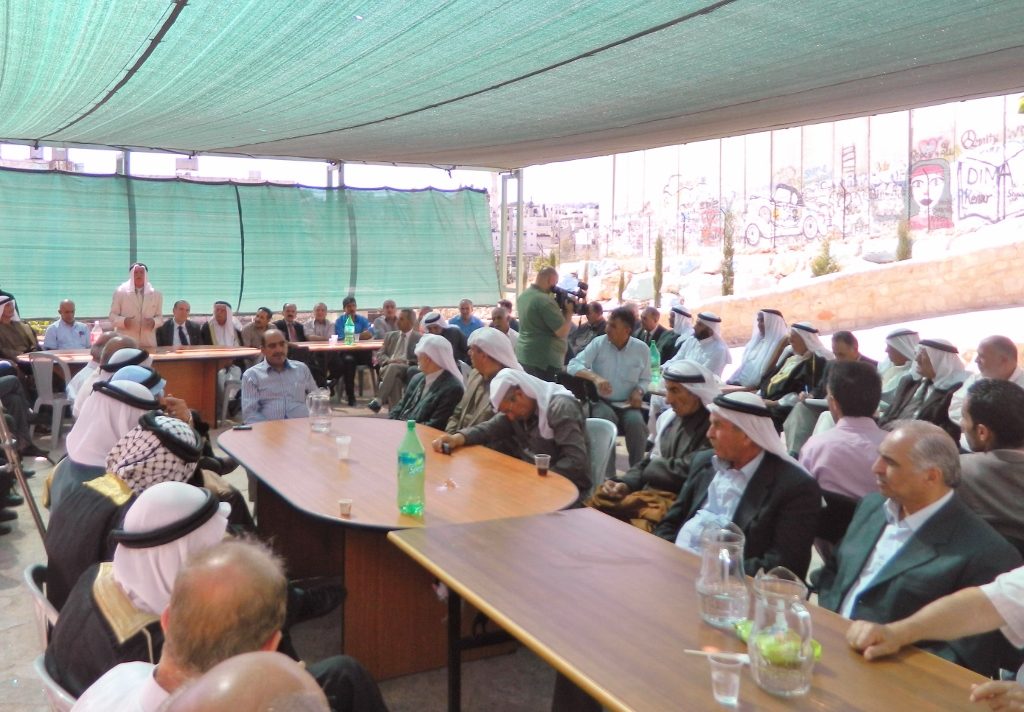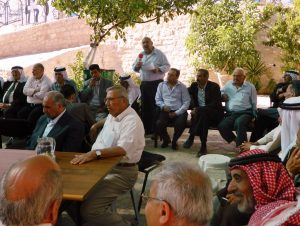Although conflict is a universal reality, the nature of disputes and the methods of resolving conflict differ from one socio-cultural context to another. For instance, in the Western tradition, conflict is commonly perceived to occur between two or more individuals, while in the Middle Eastern tradition, conflict exceeds the individual to reach the collective or the wider family. Wi’am takes a synergistic approach to conflict transformation in Palestine, integrating traditional Arabic Sulha wisdom with Western mediation techniques.
Sulha derives from the word “Sulh,” meaning “to make peace” or “reconciliation” in Arabic. This traditional Arab method for resolving conflicts has its historical roots before the dawn of Islam; its historic emergence is found in early Semitic writings and in later Christian records dating from the first century A.D. It is typical to Arab desert culture and literature and generations have passed the practice down over thousands of years. Sulha has endured primarily because it is a) based on common principles and collective wisdom typical of pluralistic communities and b) its practice was formed across religious, political, and ethnic differences in the Middle East.
Though it has survived over the years, practitioners have adapted Sulha to the contexts of modern life. Wi’am employs Sulha to supplement civil and criminal laws practiced by the state, and it is legally binding. While under tribal law in the past, Sulha was the only means for passing and enforcing rulings; today, its practice reinforces civil social order, respect, and reconciliation among feuding community members. Despite the passage of time, Sulha’s underlying goals remain the same: to redress injustices and resolve conflicts between individuals, families, neighborhoods, and the local population.
Arabic tradition holds “Nobody can carry blood, it is so heavy. Even the earth cannot absorb [it]… It will remain a stain” (Jabour, 1966). Conflicts leave a “stain” on the community. Once a wrong is committed, that conflict must be resolved in order for the community to continue to thrive. Therefore, in order to prevent acts of revenge and disastrous feuds, Wi’am employs Sulha as a means of reconciling conflicts.

The Sulha Process
Sulha begins with a social dispute in which conflicting parties call upon a neutral third-party mediator(s). Each one of the conflicting parties narrates their story to the mediators. The mediation process calls for a truce of 3 ⅓ days, and thus begins with what is called “shuttle diplomacy” between the disputants. The mediator is the official arbitrator between the two parties and he or she listens to both sides of the story/conflict. This listening stage is vital to fully grasp the issue at hand and weigh different options for resolving the problem.
Our founder, Zoughbi Alzoughbi, narrates the rest of the process:
“Mediations should deal with each case as a separate issue, observing everything, validating emotions and feelings, and paying attention to all factors and dimensions of the conflict: psychologically, socially, economically, spiritually, politically, etc. The success or failure of the mediation effort in the Palestinian context falls on the shoulders of the mediator. It is a role that requires the utmost prudence, communication skills, active listening, wit, broad knowledge, cultural sensitivity, and attention to minute details with passion, patience and a sense of justice in the air. The mediator should be a compassionate listener who listens with their heart.
Once the Sulha is performed, the dispute will cease to exist. The agreement between the parties is legally binding. Grudges, enmity, and hard feelings are dissuaded and reference to the past conflict is halted.
 The conflict situations that Sulha tackles across our society range from brawls to marriages, families, domestic violence, local feuds, honor, neighborhoods, workplace, youth conflicts, related community disputes, and land disputes. Consequently, Wi’am is proud of deploying Sulha not as something new or imported but originating in our culture. We are simply giving shape to the non-violent impulses of our people and developing methodologies that resonate with their inherent wisdom and ancestral traditions.”
The conflict situations that Sulha tackles across our society range from brawls to marriages, families, domestic violence, local feuds, honor, neighborhoods, workplace, youth conflicts, related community disputes, and land disputes. Consequently, Wi’am is proud of deploying Sulha not as something new or imported but originating in our culture. We are simply giving shape to the non-violent impulses of our people and developing methodologies that resonate with their inherent wisdom and ancestral traditions.”
-Zoughbi Alzoughbi, Founder and Director of Wi’am
